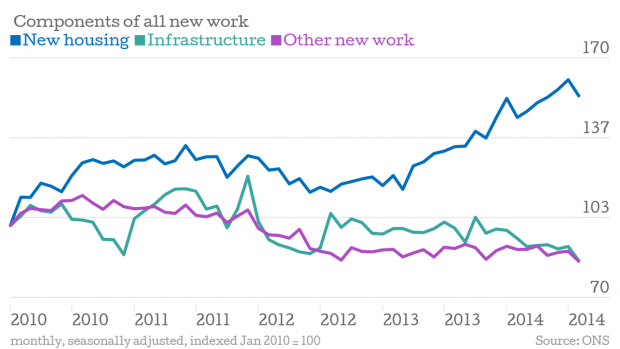Surprise as UK construction falls by 3.9 per cent in August

UK construction contracted by 3.9 per cent in August – far worse than the 0.5 per cent expansion predicted by economists.
Surprisingly almost no one saw this coming: a Bloomberg poll of analysts predicted a 0.5 per cent rise: 4.4 percentage points too optimistic. Every analyst polled by Bloomberg predicted expansion.
As the Office of National Statistics (ONS) reports, the drops were widespread, affecting almost all sectors:
All new work decreased by 4.8 per cent, with all types of work except public new housing reporting decreases; infrastructure (6.5 per cent); private commercial (5.6 per cent); private housing (5.5 per cent); private industrial (4.9 per cent); and public other (2.4 per cent).However, the fall in private housing provided the largest contribution to the overall fall in all new work and all work.
Here is a graph comparing the elements in the new work data. Even new housing dropped, which, if it became a trend, could affect the supply/demand balance and lead to upward pressure on house prices.

The report comes on the back of an apparent slowing of the housing market, which is now showing consistent signs of cooling. Several of the main indices, including Halifax and Nationwide, have reported either drops or a significant slowing of growth.
Howard Archer of IHS Global Insight called the construction figures "hugely disappointing even allowing for the fact that construction can be very volatile from month to months and particularly during the third quarter when holiday timings can impact".
Robert Wood of Berenberg Economics said the data could be further signs of an overall slowing in the UK economy:
Construction adds to the signs of some slowing in UK growth.Construction accounts for only around 6 per cent of the UK economy but its volatility gives the sector an outsized importance for economy-wide growth. Building activity can also reflect confidence in the rest of the economy.The confidence of consumers to buy a house and firms to invest in new premises. That makes the sector important.